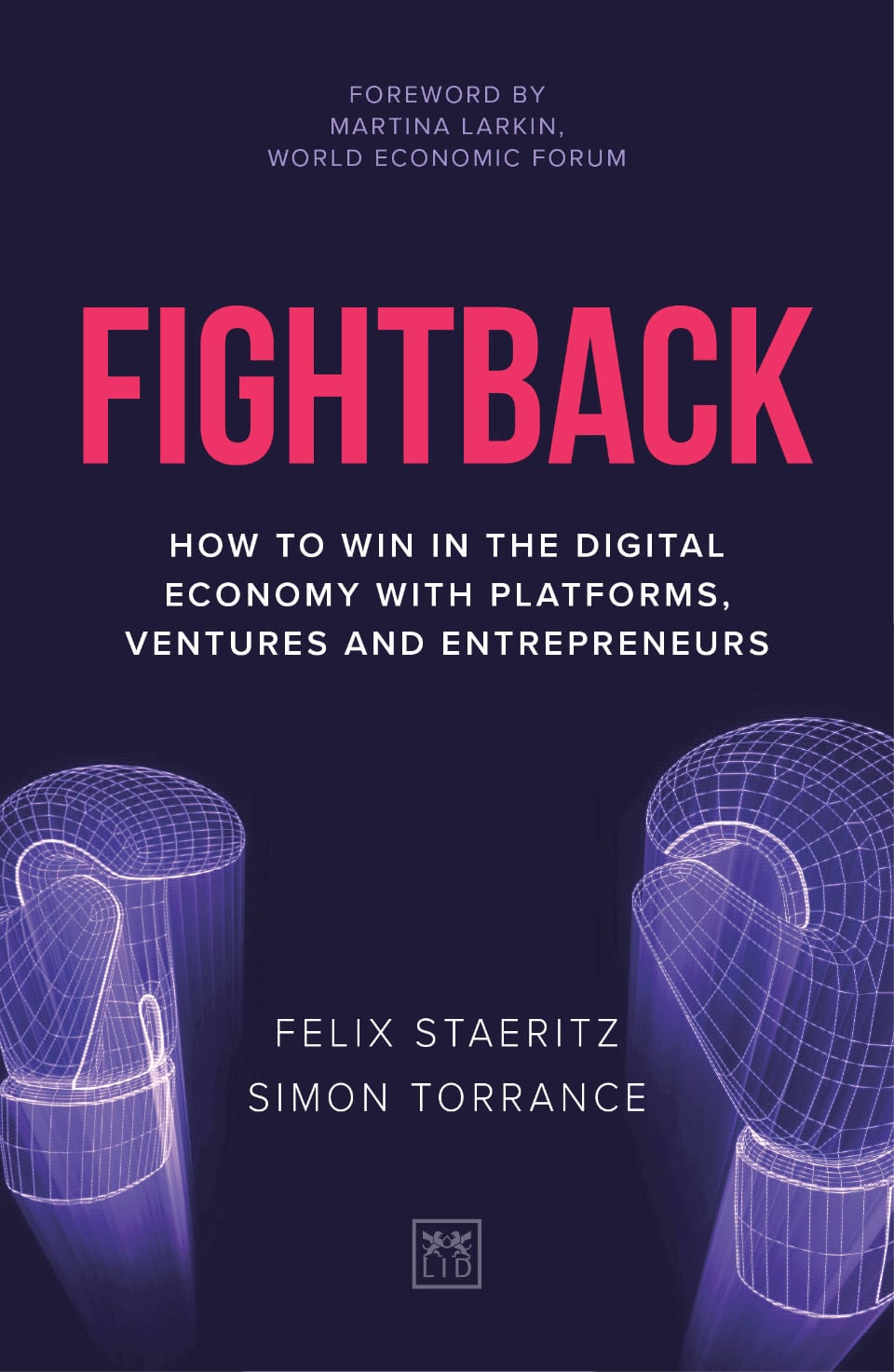Digital Disruption: Your Industry Is Next

TOO LITTLE, TOO SLOW: We live in disruptive times, with the COVID-19 pandemic threatening the very foundations of our society. But this deadly crisis is also serving to highlight just how much we need to change our world.
We are still fighting the virus, but we already understand one of the major lessons this disease has taught us: Digitalization is the biggest hope of our century for society, politics and business.
As a serial entrepreneur, founder and CEO, I can only talk about business.
There is tremendous pressure on CEOs of established companies to digitalize their businesses and re-energize their growth by rapidly accelerating investments to catch up with their high-tech competitors.
Although these larger companies have begun to invest significant amounts in digitalization, their initiatives have largely been limited to incremental modernization of the established core business, rather than radical transformation by creating new business models, and have not yet succeeded in improving either revenues or profits.
The main problems include a rate of adjustment that is slower than the rate of digital innovation (so they’ll always be playing catch-up) and the false assumption that adopting digital tools will be enough to create business growth. But the main issue is the failure to match digital initiatives with the necessary changes in cultural and business models.
If they misunderstand the full implications of digital transformation, they will underestimate the need for cultural change and miss the opportunity to bring in the talents and entrepreneurial skills that could accelerate their progress.
A new type of corporate transformation is urgently needed.
EUROPE STARTS TO FIGHT BACK
Until recently, there have been few obvious indications that this problem is being addressed – or, at least, that it is being taken as seriously as it should be.
But a growing number of Europe’s leading corporations are realizing that they need to act by joining our FightBack movement. It’s a purpose-driven network, bringing together CEOs of world-leading corporates, entrepreneurs, hands-on practitioners and some of the world’s top digital thought leaders. As a result, there is a constant exchange of ideas among its members, providing an incredible amount of knowhow, experience and insights.
In boxing, which I have done for many years, “fightback” is the term we use to define a comeback from a desperate situation. But this is not a fight against each other. The FightBack movement empowers business leaders to take responsibility for larger change and to fight obsolete assumptions and habits, the potentially deadly inertia within their companies and the reluctance to take on structural challenges. It is an opportunity for all large organizations to drive fast, sustainable, transformational change, for the good of our companies, employees and society.
It’s a wake-up call to start shaping digital change – to advance Europe digitally by leveraging our three most powerful strategic tools: platforms, ventures and entrepreneurship.
Today, we are becoming more optimistic about Europe’s chances of establishing its place in the digital age and its ability to demonstrate the resilience and resourcefulness it has shown so often in the past. And, of course, though almost all today’s big global tech disrupters are American or Chinese, many long-established organizations in both China and the US are facing exactly the same threats and can certainly learn their own lessons from the European experience.
BUILD AN ECOSYSTEM, CAPTURE THE DATA
With the Fourth Industrial Revolution and digital transformation and the emergence of platform business models, the business world is now focusing more and more on the potential of digital ecosystems. Technology and regulatory change are blurring the boundaries between products and services, producers and consumers, organizations and markets, and it no longer makes sense to think in terms of traditional industrial sectors and categories.
For the digital masters, such as Apple, transforming the business model means focusing on intangible, instead of tangible, assets. Today, organizations that leverage intangible assets perform much better. They have near-zero marginal costs of growth and investors reward them with easy access to funding, with the highest ratings of all going to the pure play digital platforms.
Today, seven of the ten most valuable companies in the world are platform-based. Some 30% of global revenues – worth some $60 trillion – could be mediated by platforms and new digital ecosystems in the next five to ten years.
The implications of this are far-reaching. Business ambitions, strategies, organizational behaviour and government policies will all need a fundamental root-and-branch rethink.
So far, however, only 2% of established companies have effectively incorporated a platform strategy into their business strategy. Established players must learn to embrace a new tech mindset that ends the traditional disconnect between different units and hierarchies. There is an abundance of data – data that was simply not available before, often generated as a by-product of transactions by other companies within a digital ecosystem.
This data flows across ecosystems and it can be used and exploited to create new value by those who recognize its potential. Tech entrepreneurs have become adept at identifying and seizing the new opportunities. Bringing tech entrepreneurs and corporations together might create a clash of cultures, but it can be a highly productive one. At FoundersLane, the corporate venture builder I’m managing as CEO, we bring these together, following our proprietary Entrepreneurial Co-Creation model, to facilitate digital transformation through a powerful framework for creating portfolios of new ventures with skilled tech entrepreneurs.
Owners and shareholders need to realize that digital technology is an essential part of these changes – not just a nice-to-have, but critical for success.
To win in the digital economy, platforms and entrepreneurship have to be combined in the process of venture-building. Ventures form the economic framework that ensures value creation through digital platforms and entrepreneurship. Setting up ventures as independent entities, with equity to attract entrepreneurs and give them a stake in the business, is one of the keys to building a strong, productive long-term relationship.
Ultimately, corporates’ ventures are establishing a new asset class in their own right.
It’s a purpose-driven world!
The lessons from the current COVID-19 are clear: purpose beats business, cooperation is stronger than standing alone and digitalization is the century’s biggest hope.
Consumers are more connected and socially conscious than ever before. They are demanding that corporations meet ever-higher standards of sustainability and social responsibility. In the face of unprecedented technological changes, Europe’s citizens are crying out for a new narrative that creates hope and restores trust.
We have seen substantial parts of the European economy lag because of an inability or unwillingness to see that yesterday’s success offers no guarantees for tomorrow. Germany’s high standard of living and relative economic success, for example, have meant that there is virtually no pressure for change.
But Europe could be right in the forefront of digital change. The continent has almost 2,000 world-leading specialist companies, out of a global total of 3,000, with the advanced skills and knowledge to potentially lead the way once they have grasped the digital nettle. Many of these are ‘hidden champions’, unknown outside their specialized areas, with expertise in fields ranging from mechanical engineering and electronics to medical technology, chemicals and plastics.
They have techniques and knowhow that are needed everywhere, and we have a responsibility to help them emerge from the shadows and make the most of their talents on a wider stage. Expertise like this needs to be shared, for the good of all.
From my experience as a boxer, I know what is needed to tackle a challenge, to move fast and to act. The COVID-19 crisis is also a reminder of the urgency to act and change – but it’s also an opportunity to rise to the occasion. This might well be the defining moment for our generation. This is the time to work together and move forward together. So what are you waiting for? Come join us and fight back.
Written by Felix Staeritz, author of FightBack, co-founder and CEO of FoundersLane, member of the World Economic Forum’s Digital Leaders Board.
Have you read?
# America’s most luxurious hotels, 2020
# Happiest countries in the world, 2020
# World’s Richest Tech Billionaire CEOs For 2020
# Best wedding destinations in the World for 2020
# Best Business Schools In The World For 2020
Bring the best of the CEOWORLD magazine's global journalism to audiences in the United States and around the world. - Add CEOWORLD magazine to your Google News feed.
Follow CEOWORLD magazine headlines on: Google News, LinkedIn, Twitter, and Facebook.
Copyright 2025 The CEOWORLD magazine. All rights reserved. This material (and any extract from it) must not be copied, redistributed or placed on any website, without CEOWORLD magazine' prior written consent. For media queries, please contact: info@ceoworld.biz









